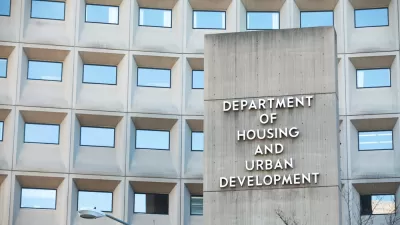More details of the Trump Administration's agenda at the Department of Housing and Urban Development were revealed late last week.

"The Trump administration may introduce minimum work requirements for some recipients of housing aid, while raising rents for others," reports Kriston Capps on a developing story that reveals details of the ongoing evolution of federal housing policy under the Trump Administration.
Capps describes the document as a draft proposal for rent reforms, with input from the U.S. Department of Housing and Urban Development (HUD). "The document sets forth line-by-line text changes to the U.S. Housing Act of 1937, the law that first established federal housing aid, plus adjustments to subsequent acts in 1959 and 1990," explains Capps. Any action to establish work requirements for housing aid would be in line with similar policies enacted for food aid and Medicaid in recent months. Capps describes the HUD action as another sign that the Trump Administration is cutting the social safety net.
Capps's coverage of the document includes a lot more detail about the proposed changes to the U.S. Housing Act, the politics of housing assistance, and the potential effects of these changes for people seeking or receiving housing assistance.
A separate article by Rachel M. Chohen and Zaid Jilani also details the leaked document, describing it as draft legislation and including a quote from HUD Spokesperson Brian Sullivan, who tells the reporters that more details about work requirements and rent increases will be available when the Trump Administration announces its budget later this month. Cohen and Jilani also report that the draft legislation proposes rent hikes for people receiving housing assistance. According to their analysis, households receiving federal housing subsidies would lose elderly and disabled deductions, a child care deduction, and medical and disability deductions.

Planetizen Federal Action Tracker
A weekly monitor of how Trump’s orders and actions are impacting planners and planning in America.

Map: Where Senate Republicans Want to Sell Your Public Lands
For public land advocates, the Senate Republicans’ proposal to sell millions of acres of public land in the West is “the biggest fight of their careers.”

Restaurant Patios Were a Pandemic Win — Why Were They so Hard to Keep?
Social distancing requirements and changes in travel patterns prompted cities to pilot new uses for street and sidewalk space. Then it got complicated.

DC Area County Eliminates Bus Fares
Montgomery County joins a growing trend of making transit free.

Platform Pilsner: Vancouver Transit Agency Releases... a Beer?
TransLink will receive a portion of every sale of the four-pack.

Toronto Weighs Cheaper Transit, Parking Hikes for Major Events
Special event rates would take effect during large festivals, sports games and concerts to ‘discourage driving, manage congestion and free up space for transit.”
Urban Design for Planners 1: Software Tools
This six-course series explores essential urban design concepts using open source software and equips planners with the tools they need to participate fully in the urban design process.
Planning for Universal Design
Learn the tools for implementing Universal Design in planning regulations.
Heyer Gruel & Associates PA
JM Goldson LLC
Custer County Colorado
City of Camden Redevelopment Agency
City of Astoria
Transportation Research & Education Center (TREC) at Portland State University
Camden Redevelopment Agency
City of Claremont
Municipality of Princeton (NJ)




























